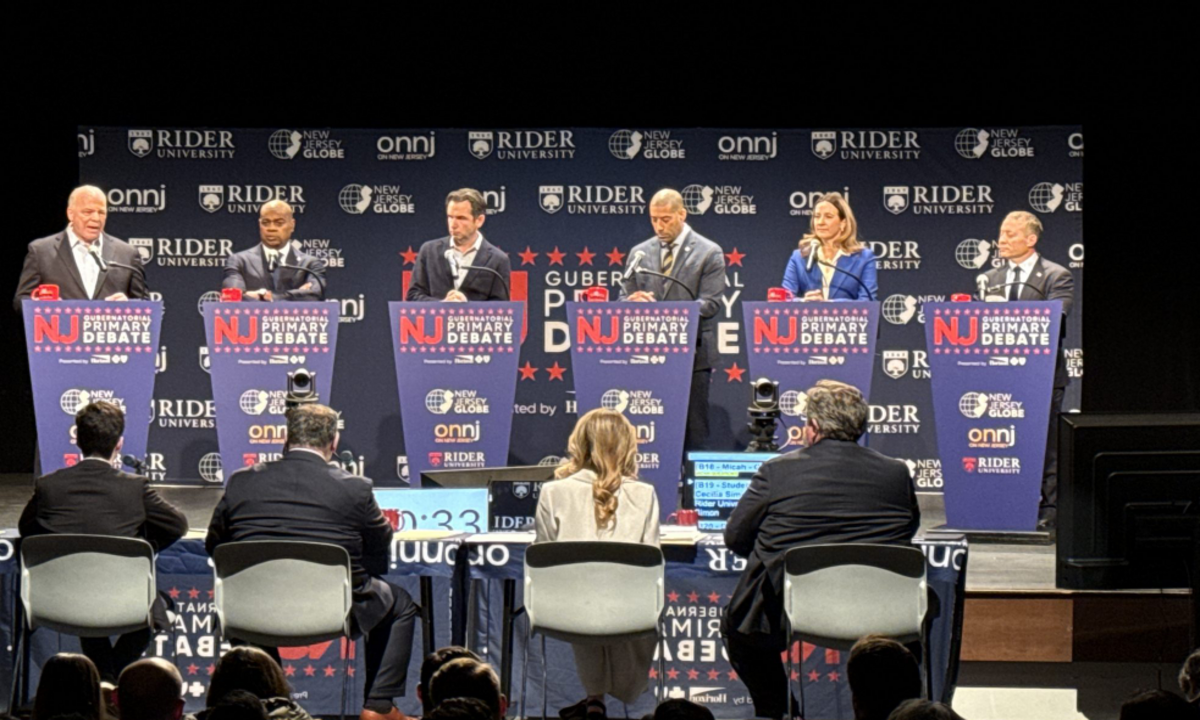Trenton, NJ – The first Democratic primary debate of the 2025 election cycle saw six candidates for New Jersey governor engage in a lively discussion about the state’s most pressing issues.
The nearly two-hour debate, held Sunday night, covered a variety of topics, from taxation to immigration, housing, and education.
The candidates were Rep. Josh Gottheimer (D-Tenafly), Rep. Mikie Sherrill (D-Montclair), Newark Mayor Ras Baraka, New Jersey City Mayor Steve Fulop, former Senate President Steve Sweeney, and teachers union leader Sean Spiller. While the debate had its moments of tension, it largely focused on the candidates’ different approaches to solving the state’s problems and their plans to lower the cost of living.
Key Moments in the Debate
One of the most contentious topics of the debate was immigration, with Baraka taking a direct jab at former President Donald Trump’s deportation efforts, calling them “white supremacy.” He criticized his fellow Democrats for being too moderate in their approaches, urging them to take stronger stands. “We can’t fight extremism with moderation,” Baraka said.
The debate also featured strong exchanges on the role of government. Gottheimer discussed his proposed tax plan, claiming that his experience in Congress would allow him to find practical solutions to the state’s financial challenges. However, he faced pushback on his vote for the controversial Laken Riley Act, a bill that mandates the detention of undocumented immigrants charged with serious crimes. Gottheimer defended his stance, stating that undocumented immigrants who commit violent crimes should not be allowed to stay in the country. He also clarified his position on immigration raids, noting that the tactics used under Trump went too far, and he would work to stop them in New Jersey.
While Gottheimer presented himself as a moderate who advocates for lower taxes and lower costs, Baraka, Fulop, and Spiller emphasized the value of municipal experience in executive roles. All three candidates agreed that effective governance starts with understanding how local governments operate and how they interact with the state.
Transgender Rights and Social Issues
Another significant point of discussion was the rights of transgender individuals in New Jersey. All candidates expressed their support for transgender New Jerseyans, especially in sports, though Sherrill became notably outspoken, calling anti-transgender legislation “bullshit.” She argued that issues like transgender athletes should not distract from more pressing issues like lowering the cost of living for all New Jersey residents. “We need to win on these issues, and we can’t afford to get caught up in these traps,” she said.
Sweeney, who had a long career in Trenton, focused on economic issues such as raising the minimum wage and providing paid family and sick leave. He took a different approach to ballot referendums, expressing concerns that they might allow more money to flood into politics, which could dilute the role of lawmakers in enacting meaningful change.
Housing, Education, and Other Key Issues
The candidates also debated how to address housing affordability and the state’s ailing public transit system. Fulop argued that unfunded mandates were putting pressure on municipalities by imposing new rules without providing adequate funding. “They tell us to do this, and they don’t help us with any resources for that,” he said.
On the education front, Spiller, who heads the New Jersey Education Association (NJEA), focused on the need for stable school funding. He said the current funding system needed to be adjusted to prevent sudden cuts that hurt school districts and the students who rely on them. “You can’t reduce the aid by such an amount that all of a sudden the services that so many are relying on are pulled out from under their feet,” Spiller said.
Candidates’ Grades on Governor Phil Murphy
Each of the candidates was asked to grade Governor Phil Murphy, who has served two terms in office. The grades varied significantly: Sweeney gave Murphy a C, while Spiller awarded him a C+. Fulop was slightly more generous, giving Murphy a B-. Gottheimer and Sherrill both gave him a B, and Baraka rated Murphy the highest with a B+.
The differing grades reflect the varied views the candidates have on Murphy’s leadership. Some candidates feel that Murphy’s administration made strides in areas like education and economic growth, while others argue that the governor’s approach hasn’t gone far enough to address the challenges facing the state.
Looking Ahead: The Democratic Race for Governor
The debate marked the beginning of a heated primary race for the Democratic nomination for governor. As the campaign continues, it will be interesting to see how each candidate builds on their positions on key issues and navigates the challenges and opportunities that New Jersey faces.
With Republican candidates set to debate soon, the Democratic field has already established its priorities—focusing on affordable housing, public education, transgender rights, and a balanced economy. As the primary season heats up, the debate over how best to lead New Jersey into the future will likely continue to intensify.
Disclaimer—Our team has checked this article to ensure its accuracy and eliminate any misinformation. We are committed to providing clear and reliable information for our readers.


